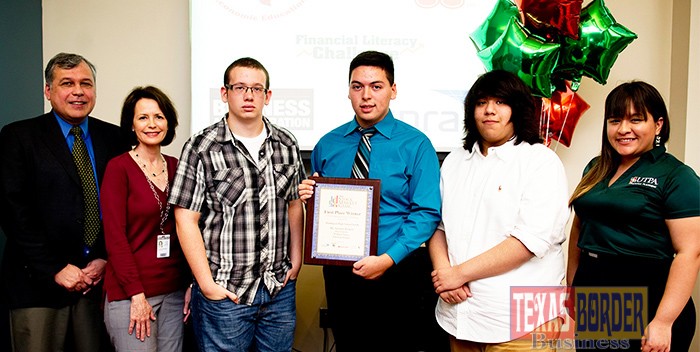
Texas Border Business
Not many teenagers can say they have achieved an 8.86 percent return above the S&P 500, but a group of students from Harlingen High School South have proved otherwise.
Team members Eric Garcia, William Nacey and Esteban Rangel were the winners in the region’s Stock Market Game, an Internet-based investment simulation and competition sponsored by The University of Texas Pan-American’s Financial Literacy Challenge (FLC). The FLC engaged six high schools from the Rio Grande Valley to participate in the 10-week program in Fall 2014. The competition included 129 teams and a total of 729 students.
“It was a good experience to learn from and to actually win was great,” Nacey said. “I don’t think a lot of kids know about the stock market; I think it should be required for graduation. (The game) teaches you how to handle your money and, if you want to have a business in the stock market, it helps in that area.”
The Stock Market Game competition is one of the many initiatives of the FLC, a program organized and administered by the UTPA Department of Economics & Finance and College of Business Administration. The mission of the FLC is to provide people across the Valley with the knowledge and skills needed to manage the complexity of personal finance.
A six-week FLC High School Outreach program, which kicked off Jan. 20, seeks to provide the knowledge and skills needed to meet the challenges of paying for college, planning for a career and building a healthy financial future. There are 10 participating high schools, from Roma to Brownsville, with about 450 students involved. This is the fifth year the FLC High School Outreach program is sponsored by State Farm’s Good Neighbor Citizenship Grant, which funds projects in areas of safety and education nationwide.
“Talking about money in most minority cultures is taboo,” said Terrance Martin, assistant professor of finance and FLC director. “So you have students talking about how encouraged they were to learn about understanding their credit, how some of the information they’ve been given over the years from friends and family was actually wrong and it could hurt them. They were very passionate about learning about investment and they are able to distinguish between wants and needs.”
Of the 30 UTPA student volunteers, known as financial literacy ambassadors, 15 travel to high schools throughout the Valley once a week to educate students on financial literacy. Some of the topics presented include setting financial goals, using credit wisely, saving and investing, and insurance basics.
“You hear about financial literacy a lot but you never really understand the need for it until you talk to students and see that they really need to learn,” said Edna Pulido, FLC program assistant and financial literacy ambassador. “It’s empowering for both mentors and students. I really want them to learn the material, but more than that, for their interest to be ignited so they can actually become self-educated (in financial literacy) in the future.”
In the upcoming weeks, the FLC will be hosting internal competitions in each of the participating high schools.
The FLC was established in 2010, but Martin revamped its organizational structure when he began working at UTPA in Fall 2013. To help reach the community, Martin said, he and the college hope to have a Financial Literacy Week of activities in April, which include hosting a Credit Report Day, and participating in the College for All Conference hosted by Region One.
“I’m volunteering to do parent-focused workshops and I just did a presentation to Proyecto Azteca on homeowners insurance so we are helping the community,” Martin said. “It’s a multi-faceted approach to tackle a major problem in the Valley.”
Proyecto Azteca, a self-help housing program that helps colonia residents build their own quality affordable homes, is one of the many organizations the FLC has partnered with.
Martin said it’s no secret that the Valley has its financial challenges. Thirty percent of the people in the Valley do not have bank accounts, and said Brownsville, Harlingen and the McAllen-Mission-Edinburg area have been identified as some of the poorest cities in the country. In addition, the student debt burden is 1.5 times more than the Texas average of 12.8 percent.
“We have an issue with lower credit scores than average; our credit scores in the region are 30 to 40 points lower than the state average,” Martin said. “That means higher interest rates on loans and credit cards, higher restriction when it comes to insurance and probably the inability to get a job, the inability to get an apartment.”
It takes financial knowledge to know you’re making financial mistakes, said Martin.
“I have made financial mistakes and that’s why I chose to go down the road I went to and the career path I chose,” Martin said. “I want people to know there is a better way.”
Martin said the content of the FLC is very similar to the financial literacy course he taught in fall 2014 called Life and Money. The course will be part of the core curriculum under The University of Texas Rio Grande Valley and will cover topics such as financial basics, borrowing, investing and protection, career development, the economics of marriage, and saving vs. consumption.
In the future, Martin hopes to launch new initiatives to reach out to students in elementary and middle schools.
“If you have somebody young seeing the value in saving money, seeing the value of not abusing student loans, they’re the ones who are going to be the agents of change,” he said. “We are trying to create mini-ambassadors to help us spread our messages, and that’s the point of the program. It may not change by taking one class … we have to start the process with the younger generation.”
For more information on the FLC, you can contact Pulido at (956) 867-5409
















